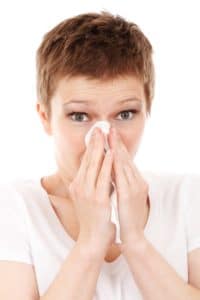Deviated Septum Breathing: Signs, Causes & Treatments
Do you ever feel like you just can’t get a full breath through your nose? Like one side is always a bit stuffy, or...
Posted on July 19, 2019
NoseNosebleeds are common in Doylestown, particularly among children between the ages of 2 and 10 and the elderly. About 60 percent of Pennsylvanians will experience a nosebleed at some point in their lives. The sight of blood pouring from your nose can be frightening but is rarely cause for alarm.

Nosebleeds (or epistaxis if you’re into medical jargon) occur when tiny blood vessels lining the inside of your nose burst. This can be caused by a variety of factors; two of the most common are dry air and nose picking. Other causes include trauma, sinus infections, allergies, deviated septum, hypertension, bleeding disorders, chemical irritants, overuse of decongestant nasal sprays, high altitudes and extreme temperatures. This is why nosebleeds in Pennsylvania are most common during the summer and winter months.
The majority of nosebleeds aren’t serious, though in rare cases they may indicate an underlying disease. Your Doylestown ENT doctor recommends seeking medical attention in the following instances:
Most summer nosebleeds respond well to treatment at home. The following instructions should help stop the flow of blood.
If you’ve tried to above steps and your nose is still bleeding, visit your doctor; you may need to have the blood vessel cauterized.
The following tips can help prevent nosebleeds:
If you can’t get your nosebleed to stop or are concerned about their frequency, contact your Pennsylvania ENT specialist for advice.
Lansdale
2100 N Broad St
Lansdale, PA 19446
(215) 368-5290
Sellersville
920 Lawn Ave, Suite 7
Sellersville, PA 18960
(215) 453-8900
Spring House
909 Sumneytown Pike, #103
Spring House, PA 19477
(215) 646-2118
Do you ever feel like you just can’t get a full breath through your nose? Like one side is always a bit stuffy, or...
Sleep is essential to your health and well-being, yet many people struggle to get their full eight hours. One often overlooked obstacle to a...
Whether you enjoy contact sports, stumble over your shoelaces during a run at Fonthill Park or are just a little clumsy, you have likely...
Nasal polyps are benign growths in the sinus and nasal passages area. They’re known for causing symptoms such as loss of smell, congestion and...